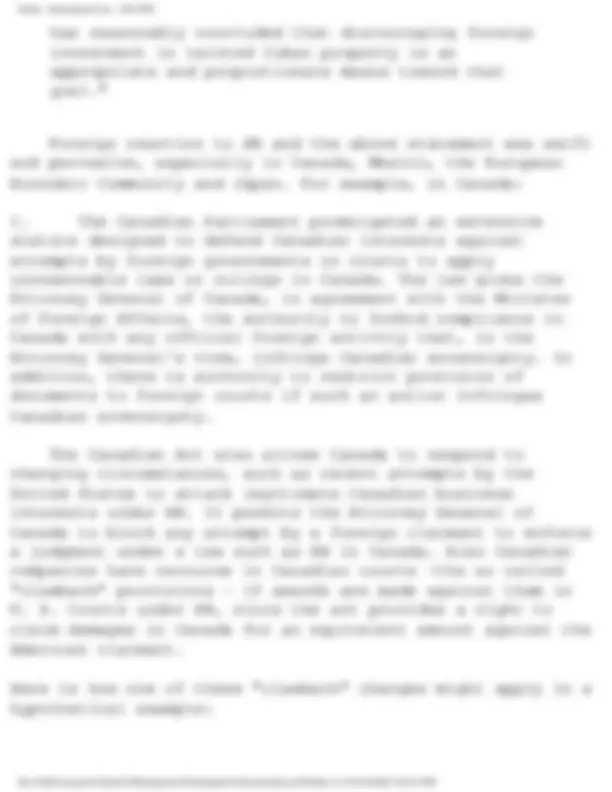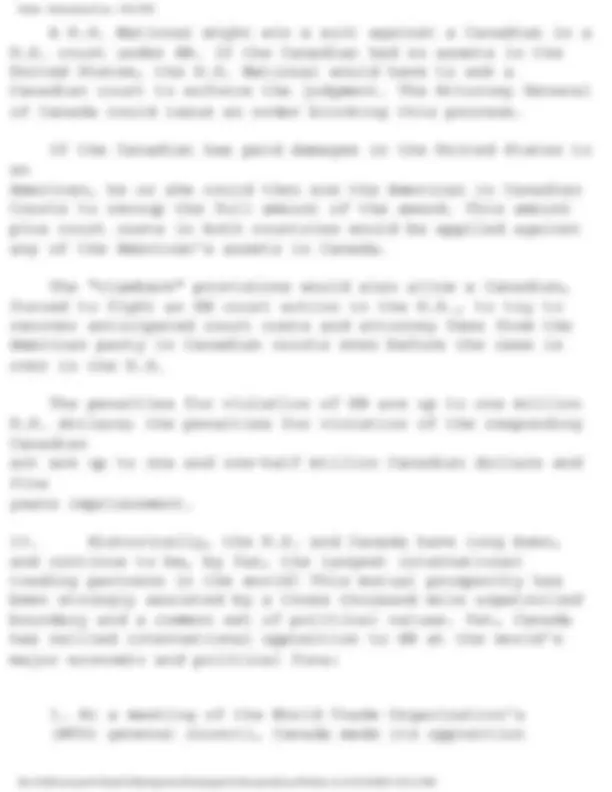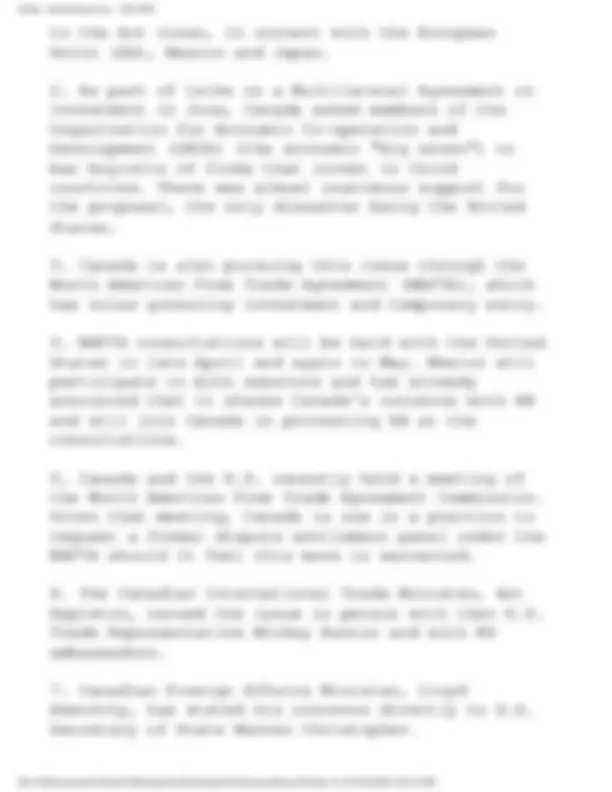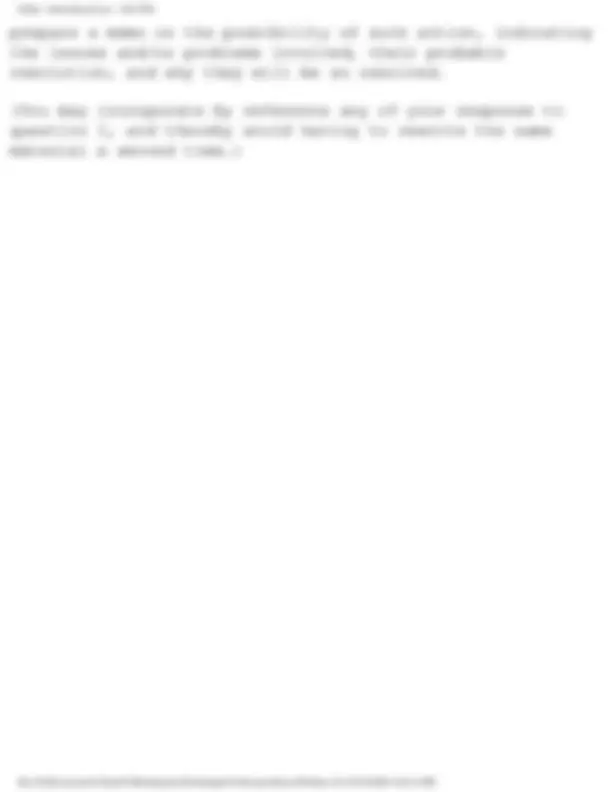






Study with the several resources on Docsity

Earn points by helping other students or get them with a premium plan


Prepare for your exams
Study with the several resources on Docsity

Earn points to download
Earn points by helping other students or get them with a premium plan
Community
Ask the community for help and clear up your study doubts
Discover the best universities in your country according to Docsity users
Free resources
Download our free guides on studying techniques, anxiety management strategies, and thesis advice from Docsity tutors
An account of the helms-burton act of 1996, signed by president clinton on september 18, 1996, which imposed economic sanctions on cuba and restricted entry into the united states for persons involved in 'trafficking in confiscated property'. The document also discusses the canadian response to the act, including the enactment of a canadian statute to defend canadian interests and the pursuit of dispute settlement panels under the north american free trade agreement (nafta).
Typology: Exams
1 / 8

This page cannot be seen from the preview
Don't miss anything!





Sultan
International Law Fall 1996
On September 18, 1996, President Clinton signed the "Cuban Liberty and Democratic Solidarity (Libertad) Act of 1996," generally known by the names of its principal sponsors as the Helms-Burton Act. (HB) The Act is a mixture of codification of existing economic sanctions previously imposed pursuant to executive orders; inducements and promises related to restoration of democracy in Cuba; threats against persons from third countries that do business with Cuba; a new, unprecedented remedy for expropriation; and restrictions on entry into the United States by persons who "traffic in confiscated property" or who are affiliated with such persons by ownership, employment or by direct family ties. The President had indicated that he would veto the bill if it reached his desk, and quite possibly it would never have done so, but for the events in the Florida Strait on Saturday, February 24, 1996. On that day, at about 3:15 in the afternoon, two Cessna 337 light planes flown by a Cuban-American organization based in Florida were blown up by missiles launched by MIG-23 and MIG-29 planes of the Cuban Air Force, apparently on standing orders of President Fidel Castro. President Clinton immediately condemned the attack, and by the following Wednesday, he announced that he now would sign HB--two weeks before the November, 1996 elections.
In the instrument of transmittal of HB to the White House, the Congress included the following statement that President Clinton quoted with approval at the public ceremony when he signed HB--one week before the election:
The United States has a legitimate interest in trafficking by third-country nationals with Cuba.
In addition, the United States has a strong interest in facilitating the rapid economic development of post-Castro Cuba without the rancor, litigation and clouds on title that Castro's foreign-investment strategy will inevitably cause when he is gone.
"The U.S. department of State has repeatedly recognized these interests. For example, in September 1993, in a message entitled "Buyer Beware: Cuba May Be Selling American Property," Secretary of State Christopher instructed our missions abroad to tell their host governments:
[we] hope that the government of Cuba will ultimately decide to return expropriated properties to their original owners. If the properties are purchased by foreign investors before this occurs, restitution of property will prove far more difficult.... Care should be taken by prospective investors to ensure that property the Cuban government attempts to sell or otherwise dispose of is not the subject of a claim by a U.S. national.
"Still further, because of the proximity of Cuba to the United States and the history of relations between the two countries, Cuba's persistence in suppressing democracy, violating human rights and refusing to satisfy international law claims against it effects the United States in a variety of ways, including the recurring crises caused by the flight of refugees. The United States has legitimate interests in crises caused by the flight of refugees. The United States has legitimate interests in bringing these problems to an end. It
A U.S. National might win a suit against a Canadian in a U.S. court under HB. If the Canadian had no assets in the United States, the U.S. National would have to ask a Canadian court to enforce the judgment. The Attorney General
of Canada could issue an order blocking this process.
If the Canadian has paid damages in the United States to an American, he or she could then sue the American in Canadian Courts to recoup the full amount of the award. This amount plus court costs in both countries would be applied against any of the American's assets in Canada.
The "clawback" provisions would also allow a Canadian, forced to fight an HB court action in the U.S., to try to recover anticipated court costs and attorney fees from the American party in Canadian courts even before the case is
over in the U.S.
The penalties for violation of HB are up to one million U.S. dollars; the penalties for violation of the responding Canadian act are up to one and one-half million Canadian dollars and
five years imprisonment.
II. Historically, the U.S. and Canada have long been, and continue to be, by far, the largest international trading partners in the world! This mutual prosperity has been strongly assisted by a three thousand mile unpatrolled boundary and a common set of political values. Yet, Canada has rallied international opposition to HB at the world's major economic and political fora:
to the Act clear, in concert with the European Union (EU), Mexico and Japan.
States.
that they would be banned from entering the United States. J. J. received such a letter on November 15, 1996. On December 1, 1996 Mary returned to college following the U.S. Thanksgiving holiday. Two days later she received a phone call from the U.S. Department of State telling her that she would have to leave the U.S. within one weeks time. After J. J. was informed of the phone call he immediately travelled to Smith College, using his drivers license as a personal ID, as is the general practice for all American and Canadian nationals crossing the border. The next day, December 5th, he is arrested by U.S. Marshals for illegal entry into the U. S. After posting bond, he and his daughter return to their home in Ottawa, Canada's capital city.
A recent graduate of the University of Dayton Law School, you are employed by a firm with a reputation in the practice of international law in Boston, where the trial of U S v. Jim Jones will be held. The Canadian government has engaged your firm as defense counsel in that case. The senior attorney in charge of the case requests that you prepare a memo listing all of the international legal issues, in order of their priority, presented by the case, how they will probably be resolved, and why you feel that they would be so resolved.
A Canadian national, you attended the University of Dayton Law School and are presently a member of the legal staff of the Canadian Ministry of Foreign Affairs in Ottawa. Your supervisor informs you that the Canadian Cabinet has unanimously agreed that the "J.J. incident" constitutes a challenge to Canadian sovereignty and honor, and has decided to seek redress, if at all possible, from the International Court of Justice (ICJ) in the Hague. He requests that you
prepare a memo on the possibility of such action, indicating the issues and/or problems involved, their probable resolution, and why they will be so resolved.
(You may incorporate by reference any of your response to question I, and thereby avoid having to rewrite the same material a second time.)